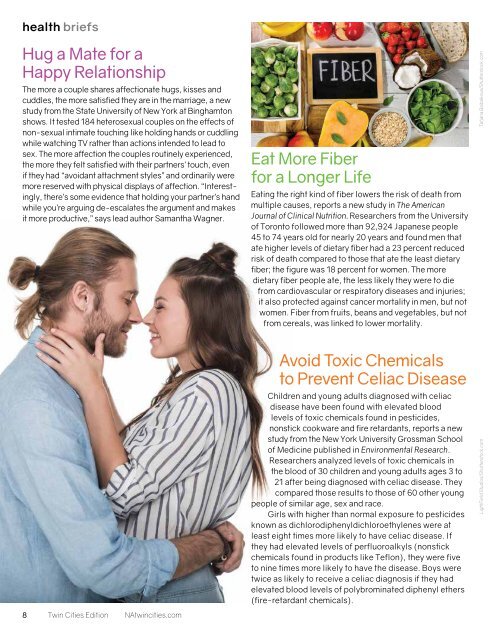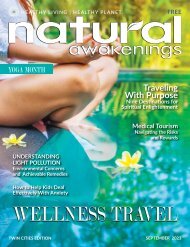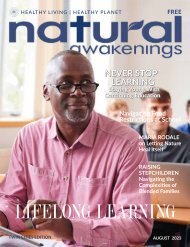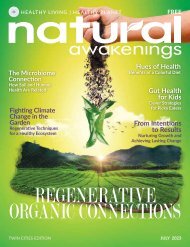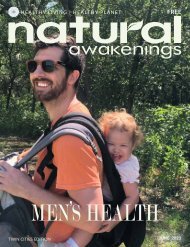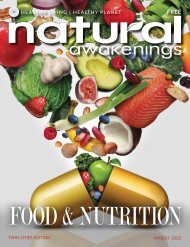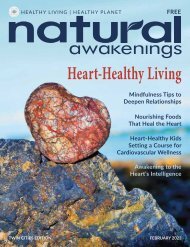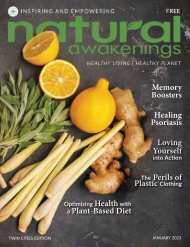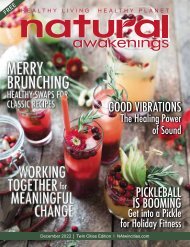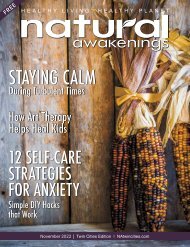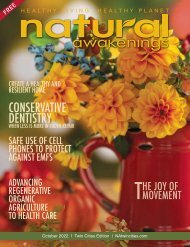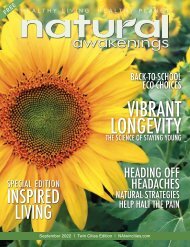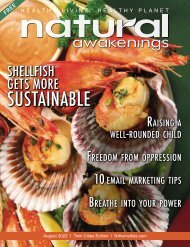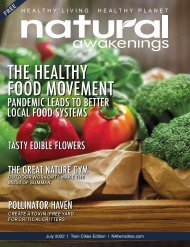Natural Awakenings Twin Cities August 2020
Read the August 2020 edition of Natural Awakenings Twin Cities. This month we focus on Biological Dentistry and Social Justice. Includes articles on no-waste garden edibles, environmental justice issues, interviews with local primary candidates, and more. Natural Awakenings Twin Cities magazine is your source for healthy living, healthy planet information. Have you visited our website lately? Sign up for our Newsletter and Digital Magazine, read archived articles from local experts, and keep up with local healthy living events. Visit NATwinCities.com today.
Read the August 2020 edition of Natural Awakenings Twin Cities. This month we focus on Biological Dentistry and Social Justice. Includes articles on no-waste garden edibles, environmental justice issues, interviews with local primary candidates, and more. Natural Awakenings Twin Cities magazine is your source for healthy living, healthy planet information. Have you visited our website lately? Sign up for our Newsletter and Digital Magazine, read archived articles from local experts, and keep up with local healthy living events. Visit NATwinCities.com today.
You also want an ePaper? Increase the reach of your titles
YUMPU automatically turns print PDFs into web optimized ePapers that Google loves.
health briefs<br />
Hug a Mate for a<br />
Happy Relationship<br />
The more a couple shares affectionate hugs, kisses and<br />
cuddles, the more satisfied they are in the marriage, a new<br />
study from the State University of New York at Binghamton<br />
shows. It tested 184 heterosexual couples on the effects of<br />
non-sexual intimate touching like holding hands or cuddling<br />
while watching TV rather than actions intended to lead to<br />
sex. The more affection the couples routinely experienced,<br />
the more they felt satisfied with their partners’ touch, even<br />
if they had “avoidant attachment styles” and ordinarily were<br />
more reserved with physical displays of affection. “Interestingly,<br />
there’s some evidence that holding your partner’s hand<br />
while you’re arguing de-escalates the argument and makes<br />
it more productive,” says lead author Samantha Wagner.<br />
Eat More Fiber<br />
for a Longer Life<br />
Eating the right kind of fiber lowers the risk of death from<br />
multiple causes, reports a new study in The American<br />
Journal of Clinical Nutrition. Researchers from the University<br />
of Toronto followed more than 92,924 Japanese people<br />
45 to 74 years old for nearly 20 years and found men that<br />
ate higher levels of dietary fiber had a 23 percent reduced<br />
risk of death compared to those that ate the least dietary<br />
fiber; the figure was 18 percent for women. The more<br />
dietary fiber people ate, the less likely they were to die<br />
from cardiovascular or respiratory diseases and injuries;<br />
it also protected against cancer mortality in men, but not<br />
women. Fiber from fruits, beans and vegetables, but not<br />
from cereals, was linked to lower mortality.<br />
Tatjana Baibakova/Shutterstock.com<br />
8 <strong>Twin</strong> <strong>Cities</strong> Edition NAtwincities.com<br />
Avoid Toxic Chemicals<br />
to Prevent Celiac Disease<br />
Children and young adults diagnosed with celiac<br />
disease have been found with elevated blood<br />
levels of toxic chemicals found in pesticides,<br />
nonstick cookware and fire retardants, reports a new<br />
study from the New York University Grossman School<br />
of Medicine published in Environmental Research.<br />
Researchers analyzed levels of toxic chemicals in<br />
the blood of 30 children and young adults ages 3 to<br />
21 after being diagnosed with celiac disease. They<br />
compared those results to those of 60 other young<br />
people of similar age, sex and race.<br />
Girls with higher than normal exposure to pesticides<br />
known as dichlorodiphenyldichloroethylenes were at<br />
least eight times more likely to have celiac disease. If<br />
they had elevated levels of perfluoroalkyls (nonstick<br />
chemicals found in products like Teflon), they were five<br />
to nine times more likely to have the disease. Boys were<br />
twice as likely to receive a celiac diagnosis if they had<br />
elevated blood levels of polybrominated diphenyl ethers<br />
(fire-retardant chemicals).<br />
LightField Studios/Shutterstock.com


